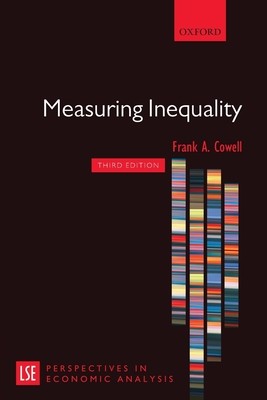
- We will send in 10–14 business days.
- Author: Frank Cowell
- Publisher: Oxford University Press, USA
- ISBN-10: 019959404X
- ISBN-13: 9780199594047
- Format: 15.7 x 23.3 x 1.4 cm, minkšti viršeliai
- Language: English
- SAVE -10% with code: EXTRA
Reviews
Description
What do we mean by inequality comparisons? If the rich just get richer and the poor get poorer, the answer might seem easy. But what if the income distribution changes in a complicated way? Can we use mathematical or statistical techniques to simplify the comparison problem in a way that has economic meaning? What does it mean to measure inequality? Is it similar to National Income? Or a price index? Is it enough just to work out the Gini coefficient?
Measuring Inequality tackles these questions and examines the underlying principles of inequality measurement and its relation to welfare economics, distributional analysis, and information theory. The book covers modern theoretical developments in inequality analysis, as well as showing how the way we think about inequality today has been shaped by classic contributions in economics and related disciplines. Formal results and detailed literature discussion are provided in two appendices. The principal points are illustrated in the main text, using examples from US and UK data, as well as other data sources, and associated web materials provide hands-on learning. Measuring Inequality is designed to appeal to both undergraduate and post-graduate students, and academic economists. Its emphasis on practical application means that it will also be useful to policy analysts and advisors.EXTRA 10 % discount with code: EXTRA
The promotion ends in 23d.05:07:12
The discount code is valid when purchasing from 10 €. Discounts do not stack.
- Author: Frank Cowell
- Publisher: Oxford University Press, USA
- ISBN-10: 019959404X
- ISBN-13: 9780199594047
- Format: 15.7 x 23.3 x 1.4 cm, minkšti viršeliai
- Language: English English
What do we mean by inequality comparisons? If the rich just get richer and the poor get poorer, the answer might seem easy. But what if the income distribution changes in a complicated way? Can we use mathematical or statistical techniques to simplify the comparison problem in a way that has economic meaning? What does it mean to measure inequality? Is it similar to National Income? Or a price index? Is it enough just to work out the Gini coefficient?
Measuring Inequality tackles these questions and examines the underlying principles of inequality measurement and its relation to welfare economics, distributional analysis, and information theory. The book covers modern theoretical developments in inequality analysis, as well as showing how the way we think about inequality today has been shaped by classic contributions in economics and related disciplines. Formal results and detailed literature discussion are provided in two appendices. The principal points are illustrated in the main text, using examples from US and UK data, as well as other data sources, and associated web materials provide hands-on learning. Measuring Inequality is designed to appeal to both undergraduate and post-graduate students, and academic economists. Its emphasis on practical application means that it will also be useful to policy analysts and advisors.

Reviews